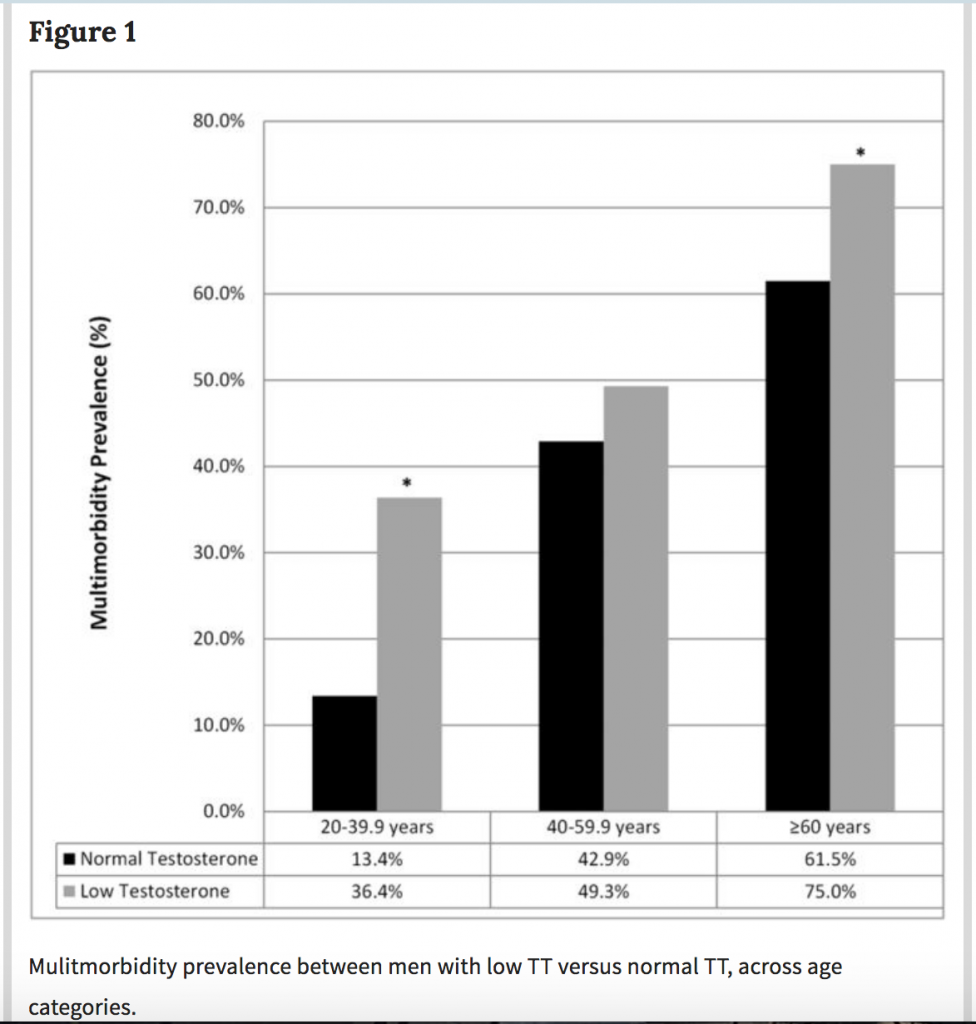It is well known that male testosterone levels decline with age, which can lead to sarcopenia, osteopenia and an increase in chronic disease risk, such as obesity, Type-2 diabetes and cardiovascular disease. But, what is the ideal level among men of various age groups? A new study, published in Scientific Reports, aimed to find out. What they found was that low amounts of the hormone could also be associated with chronic disease, even among men 40 years of age and younger. The following are excerpts from the study.“If we look at data for men from a population level, it has become evident over time that chronic disease  is on the rise in older males,” says Mark Peterson, Ph.D., M.S., FACSM, lead author of the study and assistant professor of physical medicine and rehabilitation at Michigan Medicine. “But we’re also finding that a consequence of being obese and physically inactive is that men are seeing declines in testosterone even at younger ages.”Testosterone Study
is on the rise in older males,” says Mark Peterson, Ph.D., M.S., FACSM, lead author of the study and assistant professor of physical medicine and rehabilitation at Michigan Medicine. “But we’re also finding that a consequence of being obese and physically inactive is that men are seeing declines in testosterone even at younger ages.”Testosterone Study
Testosterone Study
Chronic Disease Factors
For the full sample, the mean number of chronic disease risk factors was 1.5 ± 1.3, with hypertension as the most prevalent individual condition (48.6%), followed by hypertriglyceridemia (28%), low HDL-C (26.8%), arthritis (19.7%), diabetes (17.9%), clinical depression (7.4%), CVD (7.2%), stroke (4%), and pulmonary disease (2.5%).
The prevalence of multimorbidity was 41.3% for all men; however, there was a significant age association (p < 0.001). For young, middle-aged, and older men, the prevalence of multimorbidity was 17.4%, 44.2%, and 65.3%, respectively. Of the 502 total possible combinations of multimorbidity, we found 58 unique multimorbidity combinations, and the most prevalent combinations were: (a) hypertension and arthritis (n = 107); (b) hypertension and low HDL-C (n = 103); (c) diabetes and hypertension (n = 86); (d) hypertension and hypertriglyceridemia (n = 50); hypertriglyceridemia and low HDL-C (n = 47); and diabetes, hypertension, and arthritis (n = 42).
Testosterone Deficiencies
Prevalence of testosterone deficiencies (<300 ng/dL [10.4 nmol/L]) was 30.8% for the entire sample, and 22.6%, 35.8%, and 34.6% for young, middle-aged, and older men, respectively.
- Significant higher prevalences of individual chronic diseases were found between men with testosterone deficiency as compared to men with normal TT (Click here for full results in Table 2).
- Multimorbidity was significantly more prevalent among men with testosterone deficiency, compared to normal TT in the entire group (36.6% vs 55.2%; p < 0.001); however, differences were only seen within the younger (testosterone deficiency: 36.4%; normal TT: 13.5%; p < 0.001) and older men (testosterone deficiency: 75.0%; normal TT: 61.5%; p < 0.001)
- Both TT and normal grip strength (NGS) were robustly associated with multimorbidity (p < 0.001). Secondary analysis demonstrated that TT was significantly correlated to NGS (r = 0.35; p < 0.001) (Fig. 2), even after adjusting for age, race/ethnicity, income and education.
- Unadjusted and adjusted logistic models revealed a robust association between the age-specific low-TT and moderate-TT tertiles (reference high TT tertiles) and multimorbidity (Table 3).
- In the final multiple logistic model, both low TT and moderate-TT tertiles were still significantly associated with multimorbidity even after adjusting for NGS (Table 4)
Study Significance
A lot of men may not be aware of the risk factors for testosterone deficiency because of their current lifestyle. And more importantly, that declining levels could be contributing to a silent decline in overall health … ” says Peterson, Ph.D., M.S., FACSM.
- They found that low total testosterone was associated with multimorbidity in all age groups — but it was more prevalent among young and older men with testosterone deficiency.
- The lowest age-category-specific TT tertile and the middle age-category-specific TT tertile were associated a >3-fold and nearly 75% higher multimorbidity risk, when compared to the highest age-category-specific tertiles of TT.
Peterson says, “Men should be concerned about declining total testosterone, even if it has not reached a level to warrant a clinical diagnosis (<300 ng/dL [10.4 nmol/L]).” Co-author Aleksandr Belakovskiy, M.D., a resident in family medicine at Michigan Medicine, who helped to design and carry out the study, notes that the results show the need for further testing and research.
This study showed a robust association between testosterone and multiple medical morbidities that could influence the way we think about testosterone in general practice,” Belakovskiy says. “While these findings cannot prove causation, it does spark the need for better clinical awareness and more research.”
The researchers concluded that the results suggest a much higher prevalence of testosterone deficiency occurs in men across the adult age-span than what has been previously reported, and that young and elderly men with testosterone deficiency exhibit a significantly higher multimorbidity risk than their eugonadal counterparts.
Source: Scientific Reports. Vol 8, Article number: 5897 (2018), doi:10.1038/s41598-018-24347-6.






